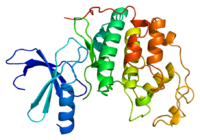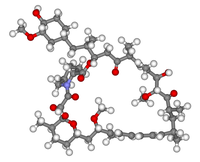
Design, synthesis, and biological evaluation of a potent PLK4 inhibitor WY29 with 1H‐pyrazolo[3,4‐d]pyrimidine scaffold
Sign Up to like & getrecommendations! Published in 2022 at "Archiv der Pharmazie"
DOI: 10.1002/ardp.202200490
Abstract: Centriole duplication occurs once per cell cycle and is regulated by Polo‐like kinase 4 (PLK4). Overexpression of PLK4 in somatic cells can lead to the excessive formation of centrioles, directly causing chromosome segregation errors and… read more here.
Keywords: compound; wy29; pyrazolo pyrimidine; plk4 ... See more keywords

Silencing of long non‐coding RNA DLX6‐AS1 weakens neuroblastoma progression by the miR‐513c‐5p/PLK4 axis
Sign Up to like & getrecommendations! Published in 2020 at "IUBMB Life"
DOI: 10.1002/iub.2392
Abstract: Emerging evidence has demonstrated the crucial roles of long noncoding RNAs in human cancers, including neuroblastoma (NB). DLX6 antisense RNA 1 (DLX6‐AS1) has been identified as an oncogenic driver in NB. However, the mechanisms of… read more here.
Keywords: progression; dlx6 as1; mir 513c; plk4 ... See more keywords

Bimodal Binding of STIL to Plk4 Controls Proper Centriole Copy Number.
Sign Up to like & getrecommendations! Published in 2018 at "Cell reports"
DOI: 10.1016/j.celrep.2018.05.030
Abstract: The number of centrioles is tightly controlled to ensure bipolar spindle assembly, which is a prerequisite to maintain genome integrity. However, our understanding of the fundamental principle that governs the formation of a single procentriole… read more here.
Keywords: plk4; bimodal binding; stil; formation ... See more keywords

FAM46C/TENT5C functions as a tumor suppressor through inhibition of Plk4 activity
Sign Up to like & getrecommendations! Published in 2020 at "Communications Biology"
DOI: 10.1038/s42003-020-01161-3
Abstract: Polo like kinase 4 (Plk4) is a tightly regulated serine threonine kinase that governs centriole duplication. Increased Plk4 expression, which is a feature of many common human cancers, causes centriole overduplication, mitotic irregularities, and chromosomal instability.… read more here.
Keywords: plk4; tumor suppressor; fam46c tent5c; activity ... See more keywords

PLK4: a link between centriole biogenesis and cancer
Sign Up to like & getrecommendations! Published in 2018 at "Expert Opinion on Therapeutic Targets"
DOI: 10.1080/14728222.2018.1410140
Abstract: ABSTRACT Introduction: Polo like kinase (PLK) is known to play a pivotal role in various cell cycle processes to perpetuate proper division and growth of the cells. Polo like kinase-4 (PLK4) is one such kinase… read more here.
Keywords: plk4; link centriole; centriole biogenesis; plk4 link ... See more keywords

Asterless is a Polo-like kinase 4 substrate that both activates and inhibits kinase activity depending on its phosphorylation state
Sign Up to like & getrecommendations! Published in 2018 at "Molecular Biology of the Cell"
DOI: 10.1091/mbc.e18-07-0445
Abstract: Centriole assembly initiates when Polo-like kinase 4 (Plk4) interacts with a centriole “targeting-factor.” In Drosophila, Asterless/Asl (Cep152 in humans) fulfills the targeting role. Interestingly, Asl also regulates Plk4 levels. The N-terminus of Asl (Asl-A; amino… read more here.
Keywords: phosphorylation; plk4; kinase activity; kinase ... See more keywords

Polo-like kinase 4 homodimerization and condensate formation regulate its own protein levels but are not required for centriole assembly.
Sign Up to like & getrecommendations! Published in 2023 at "Molecular biology of the cell"
DOI: 10.1091/mbc.e22-12-0572
Abstract: Polo-like kinase 4 (Plk4) is the master-regulator of centriole assembly and cell cycle-dependent regulation of its activity maintains proper centrosome number. During most of the cell cycle, Plk4 levels are nearly undetectable due to its… read more here.
Keywords: polo like; like kinase; centriole assembly; plk4 ... See more keywords

Inhibition of PLK4 might enhance the anti‐tumour effect of bortezomib on glioblastoma via PTEN/PI3K/AKT/mTOR signalling pathway
Sign Up to like & getrecommendations! Published in 2020 at "Journal of Cellular and Molecular Medicine"
DOI: 10.1111/jcmm.14996
Abstract: Glioblastoma (GBM) is one of the most common aggressive cancers of the central nervous system in adults with a high mortality rate. Bortezomib is a boronic acid–based potent proteasome inhibitor that has been actively studied… read more here.
Keywords: tumour effect; plk4; effect bortezomib; bortezomib ... See more keywords

PLK4 Is a Potential Biomarker for Abnormal Tumor Proliferation, Immune Infiltration, and Prognosis in ccRCC
Sign Up to like & getrecommendations! Published in 2022 at "Computational and Mathematical Methods in Medicine"
DOI: 10.1155/2022/6302234
Abstract: Background PLK4 is highly expressed and associated with poor prognosis in various malignancies. However, the role of PLK4 in clear cell renal cell carcinoma (ccRCC) is still unclear. This study is aimed at analyzing the… read more here.
Keywords: ccrcc; immune infiltration; prognosis ccrcc; plk4 ... See more keywords

Abstract 4998: Selective PLK4 inhibition demonstrates synthetic lethality in TRIM37 amplified neuroblastoma and breast cancer models while less selective inhibitors do not
Sign Up to like & getrecommendations! Published in 2023 at "Cancer Research"
DOI: 10.1158/1538-7445.am2023-4998
Abstract: Amplification and copy number gains of the 17q23 amplicon are common in breast cancer and neuroblastoma and have been associated with early relapse and poor prognosis (Ganesan et al 2012; Takita et al. 2017). A… read more here.
Keywords: inhibition; less selective; plk4; trim37 ... See more keywords

Expression Analyses of Polo-Like Kinase 4, a Gene Product Responsible for Autosomal Recessive Microcephaly and Seckel Syndrome, during Mouse Brain Development
Sign Up to like & getrecommendations! Published in 2022 at "Developmental Neuroscience"
DOI: 10.1159/000526914
Abstract: Polo-like kinase 4 (Plk4) is a ser/thr kinase, which plays a central role in centriole duplication during the cell cycle. PLK4 gene abnormalities are responsible for autosomal recessive chorioretinopathy-microcephaly syndrome and Seckel syndrome. In this… read more here.
Keywords: mouse brain; polo like; kinase; plk4 ... See more keywords